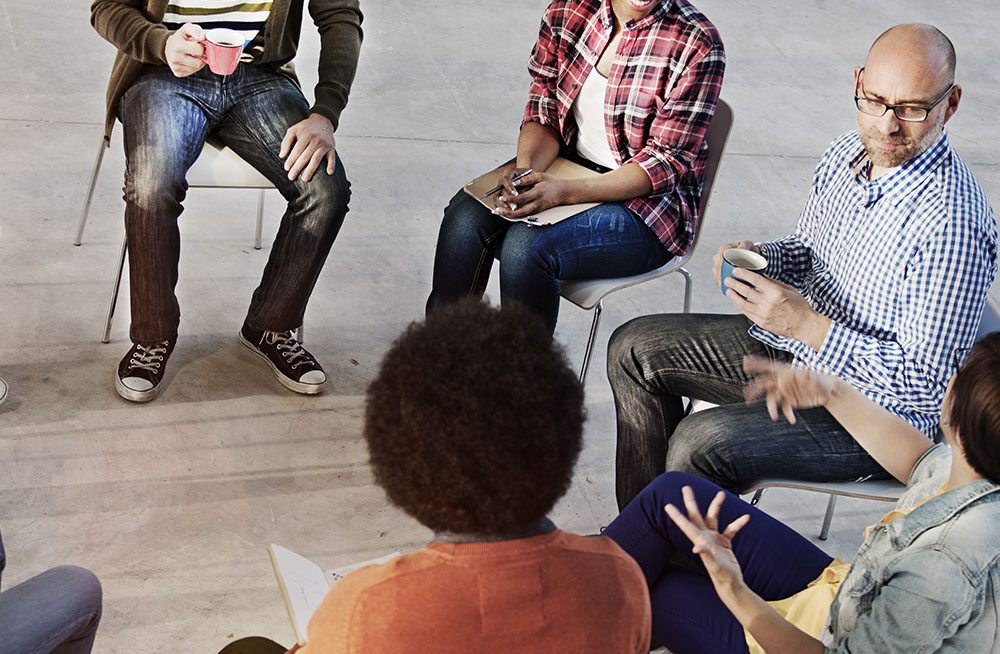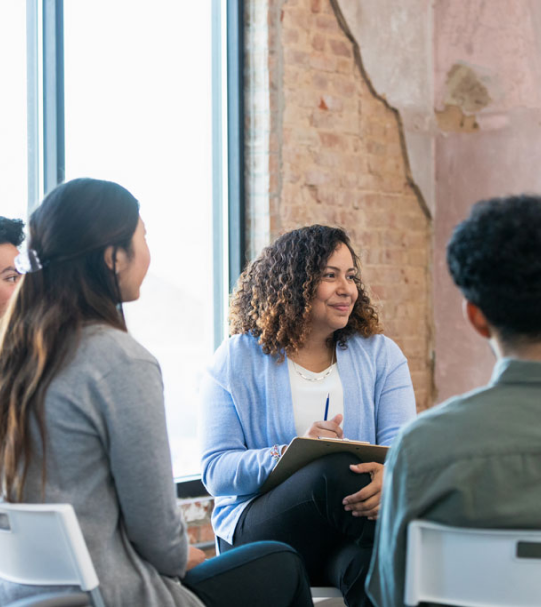
Psychoeducational Groups for Addiction Treatment
Compassionate Care & Innovative Treatment | Wellbridge

Empowering Recovery Through Education
Welcome to Wellbridge’s Psychoeducational Groups for Addiction, where education meets empowerment on the path to recovery. Our psychoeducational groups offer a supportive environment for individuals navigating addiction, providing valuable insights, practical tools, and peer support to foster personal growth and resilience.
Led by our team of experienced clinicians, these groups combine evidence-based education with interactive discussions, helping you to gain a deeper understanding of addiction and develop strategies for long-lasting wellness.
What Is a Psychoeducational Group?
A psychoeducational group focuses on providing participants with comprehensive information and understanding about addiction, its underlying mechanisms, and its impact on your life.[1] Group members learn about the biological, psychological, and social aspects of addiction, including the factors that contribute to its development and perpetuation.
Group discussions may explore topics such as the cycle of addiction, triggers, and cravings, the effects of substance use on the brain and body, and the connection between addiction and mental health disorders.[2]
In addition to addressing addiction-specific topics, psychoeducational groups may also cover co-occurring issues commonly associated with addiction, such as anxiety, depression, trauma, and relationship difficulties. Participants learn about the interplay between addiction and co-occurring disorders and strategies for managing symptoms and improving overall well-being.
By gaining insight into these interconnected challenges, attendees are better equipped to identify and address underlying issues contributing to their addictive behaviors, paving the way for more effective recovery outcomes. Through education, discussion, and peer support, psychoeducational groups provide you with valuable tools and resources to navigate the complexities of addiction and co-occurring issues on your journey to recovery.
Do you think a Psychoeducational Group could be right for you or a loved one? We’re ready to help you recover.What Are The Benefits of Vocational Rehabilitation Programs?
Participating in psychoeducational groups can be a valuable component of addiction recovery, offering you a supportive and educational environment to learn, share, and grow. Some benefits include:[3]
- Gaining a deeper understanding of addiction and its effects
- Learning practical strategies for managing cravings and triggers
- Finding support and camaraderie from peers facing similar challenges
- Reducing feelings of isolation and stigma associated with addiction
- Developing coping skills, life skills, and resilience to navigate stress and setbacks
- Receiving education on co-occurring issues such as anxiety and depression
- Enhancing problem-solving skills and emotional regulation abilities
- Building self-awareness, self-control, and self-esteem
- Accessing evidence-based therapeutic techniques like cognitive-behavioral therapy
- Taking proactive steps towards long-term recovery and overall well-being
How Can Psychoeducational Groups Help in the Recovery Process?
Psychoeducational groups play a crucial role in the recovery process by providing participants with essential knowledge, skills, and support to navigate the challenges of addiction and achieve lasting sobriety.[4] These support groups offer a structured platform for individuals to deepen one’s understanding of addiction-related topics beyond what may be covered in traditional therapy sessions.
By exploring various aspects of addiction, participants can gain insights into the underlying causes of substance use and develop a clearer perspective on the recovery journey.
Furthermore, psychoeducational groups foster a sense of empowerment among participants by equipping them with practical tools and strategies for managing their addiction.[5] Through interactive discussions, role-playing exercises, and educational materials, attendees learn effective coping mechanisms to deal with triggers, cravings, and high-risk situations.
This newfound knowledge empowers participants to take control of their recovery process and make informed decisions that support their sobriety.
Psychoeducational groups also provide a supportive and non-judgmental environment where you can share your experiences, challenges, and successes with others who understand your journey. This sense of camaraderie and connection can be immensely beneficial in reducing feelings of isolation and shame commonly associated with addiction.
By fostering a supportive community, psychoeducational groups create a safe space for you to express yourself, seek guidance, and receive encouragement from your peers.
Do Psychoeducational Groups Address Dual Diagnosis Issues, Too?
Yes, psychoeducational groups frequently address dual diagnosis issues, recognizing the common co-occurrence of addiction and mental health disorders. These groups offer a platform for participants to gain a deeper understanding of the interplay between addiction and co-occurring conditions such as depression, anxiety, bipolar disorder, or PTSD.
Psychoeducational groups provide practical tools and coping skills specifically tailored to address the complexities of dual diagnosis. Participants receive education on evidence-based therapeutic techniques for managing both addiction and mental health symptoms, including cognitive-behavioral strategies, mindfulness practices, and stress-reduction techniques.
By integrating information on both addiction and co-occurring disorders, these psychoeducational groups for substance abuse empower you to develop a holistic understanding of personal challenges and equip you with the resources needed to support your recovery journey comprehensively.
The supportive environment of psychoeducational groups facilitates peer interaction and mutual support among participants facing similar dual diagnosis challenges. Sharing experiences, insights, and coping strategies within the group fosters a sense of community and validation, reducing feelings of isolation and stigma often associated with dual diagnosis.
This sense of camaraderie encourages you to explore vulnerabilities, seek help when needed, and commit to ongoing recovery and well-being.
Frequently Asked Questions About Psychoeducational Groups
How do psychoeducational groups differ from other types of therapy?
Psychoeducational groups focus primarily on providing participants with information and education on specific topics related to mental health, addiction, or personal development. Unlike traditional therapy or other interventions, which may involve exploring emotions and past experiences in depth, psychoeducational groups emphasize learning practical skills, strategies, and coping mechanisms.
What topics are covered in psychoeducational groups for addiction?
Psychoeducational group therapy for addiction covers a wide range of topics designed to deepen participants’ understanding of addiction, recovery, and related issues. Common topics may include the neuroscience of addiction, coping skills for managing cravings and triggers, the impact of addiction on relationships and family dynamics, relapse prevention strategies, and the connection between addiction and mental health disorders.
Are psychoeducational groups confidential?
Yes, psychoeducational substance use groups typically adhere to strict confidentiality guidelines to create a safe and supportive environment for participants. Group facilitators emphasize the importance of confidentiality and encourage members to respect each other’s privacy by refraining from sharing information outside of the group.
How long do psychoeducational group sessions typically last?
The duration of psychoeducational group sessions can vary depending on the specific treatment program or recovery center. However, sessions commonly range from 60 to 90 minutes, with some programs offering longer sessions or multiple sessions per week.
Are psychoeducational groups interactive, or are they more lecture-based?
Psychoeducational groups often incorporate interactive elements to engage participants actively in the learning process. While facilitators may provide information through presentations or lectures, they also encourage group discussions, activities, role-playing exercises, and skill-building exercises to enhance learning and promote peer interaction.
Are psychoeducational groups only for individuals with substance use disorders, or can they also benefit family members or loved ones?
Psychoeducational groups can benefit not only individuals struggling with addiction but also family members, loved ones, and caregivers. Some programs offer specialized psychoeducational groups for family members, providing education, support, and guidance on understanding addiction, setting boundaries, and promoting healthy communication within the family unit.
Sources
[1] Center for Substance Abuse Treatment. (2018). 2 Types of Groups Commonly Used in Substance Abuse Treatment. Nih.gov; Substance Abuse and Mental Health Services Administration (US). https://www.ncbi.nlm.nih.gov/books/NBK64214/ on May 1, 2024
[2] Module 2: Types of Groups Used in Substance Abuse Treatment Based on material in Chapter 2 of TIP 41, Substance Abuse Treatment: Group Therapy. (n.d.). https://store.samhsa.gov/sites/default/files/tip41_mod2_0.pdf on May 1, 2024
[3] Group therapy in substance use treatment. (n.d.). https://store.samhsa.gov/sites/default/files/pep20-02-01-020.pdf on May 1, 2024
[4] Sarkhel, S., Singh, O., & Arora, M. (2020). Clinical Practice Guidelines for Psychoeducation in Psychiatric Disorders General Principles of Psychoeducation. Indian Journal of Psychiatry, 62(8), 319–323. https://doi.org/10.4103/psychiatry.indianjpsychiatry_780_19 on May 1, 2024
[5] Ekhtiari, H., Rezapour, T., Aupperle, R. L., & Paulus, M. P. (2017). Neuroscience-informed psychoeducation for addiction medicine: A neurocognitive perspective. Progress in Brain Research, 235(235), 239–264. https://doi.org/10.1016/bs.pbr.2017.08.013 on May 1, 2024
Learn More About Psychoeducational Groups At Wellbridge
There’s nothing wrong with asking for help. Embrace the support and guidance available to you, and never underestimate the resilience of the human spirit. With determination, courage, and support, you can overcome the obstacles in your path and create a life filled with purpose, joy, and fulfillment. Reach out today for dedicated support.